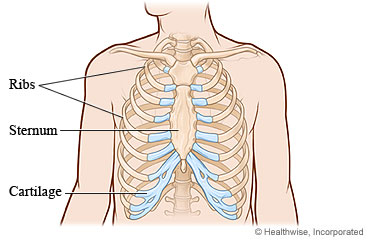
Overview
The sternum is a long, flat bone in the center of the chest. It is connected to the ribs with cartilage. Together with the ribs, it helps to protect important organs in the chest, such as the heart and lungs, from damage.
The sternum is also called the breastbone.
Most broken sternums are caused by car accidents.
In most cases, a broken sternum will heal on its own. It can take 3 months or longer for the pain to go away.
The doctor has checked you carefully, but problems can develop later. If you notice any problems or new symptoms, get medical treatment right away.
You heal best when you take good care of yourself. Eat a variety of healthy foods, and don't smoke.
Follow-up care is a key part of your treatment and safety. Be sure to make and go to all appointments, and call your doctor if you are having problems. It's also a good idea to know your test results and keep a list of the medicines you take.
How can you care for yourself at home?
- Be safe with medicines. Take pain medicines exactly as directed.
- If the doctor gave you a prescription medicine for pain, take it as prescribed.
- If you are not taking a prescription pain medicine, ask your doctor if you can take an over-the-counter medicine.
- Put ice or a cold pack on your chest for 10 to 20 minutes at a time. Try to do this every 1 to 2 hours for the next 3 days (when you are awake) or until the swelling goes down. Put a thin cloth between the ice and your skin.
- Even if it hurts, cough or take the deepest breath you can at least once every hour. This will get air deeply into your lungs and reduce your chance of getting pneumonia or a partial collapse of a lung. Hold a pillow against your chest to make this less painful.
- Get plenty of rest.
- Avoid activities that may put pressure on your chest or cause a blow to the chest until the pain is gone.
When should you call for help?
Call 911 anytime you think you may need emergency care. For example, call if:
- You passed out (lost consciousness).
- You have severe trouble breathing.
- You have a fast or irregular heartbeat.
Call your doctor now or seek immediate medical care if:
- You have new or worse trouble breathing.
- Your pain gets worse.
- You are dizzy or lightheaded, or you feel like you may faint.
- You have a fever.
- You have a new cough or your cough gets worse.
Watch closely for changes in your health, and be sure to contact your doctor if:
- Your pain does not get better as expected.
Current as of: July 31, 2024
Author: Ignite Healthwise, LLC Staff
Clinical Review Board
All Healthwise education is reviewed by a team that includes physicians, nurses, advanced practitioners, registered dieticians, and other healthcare professionals.

